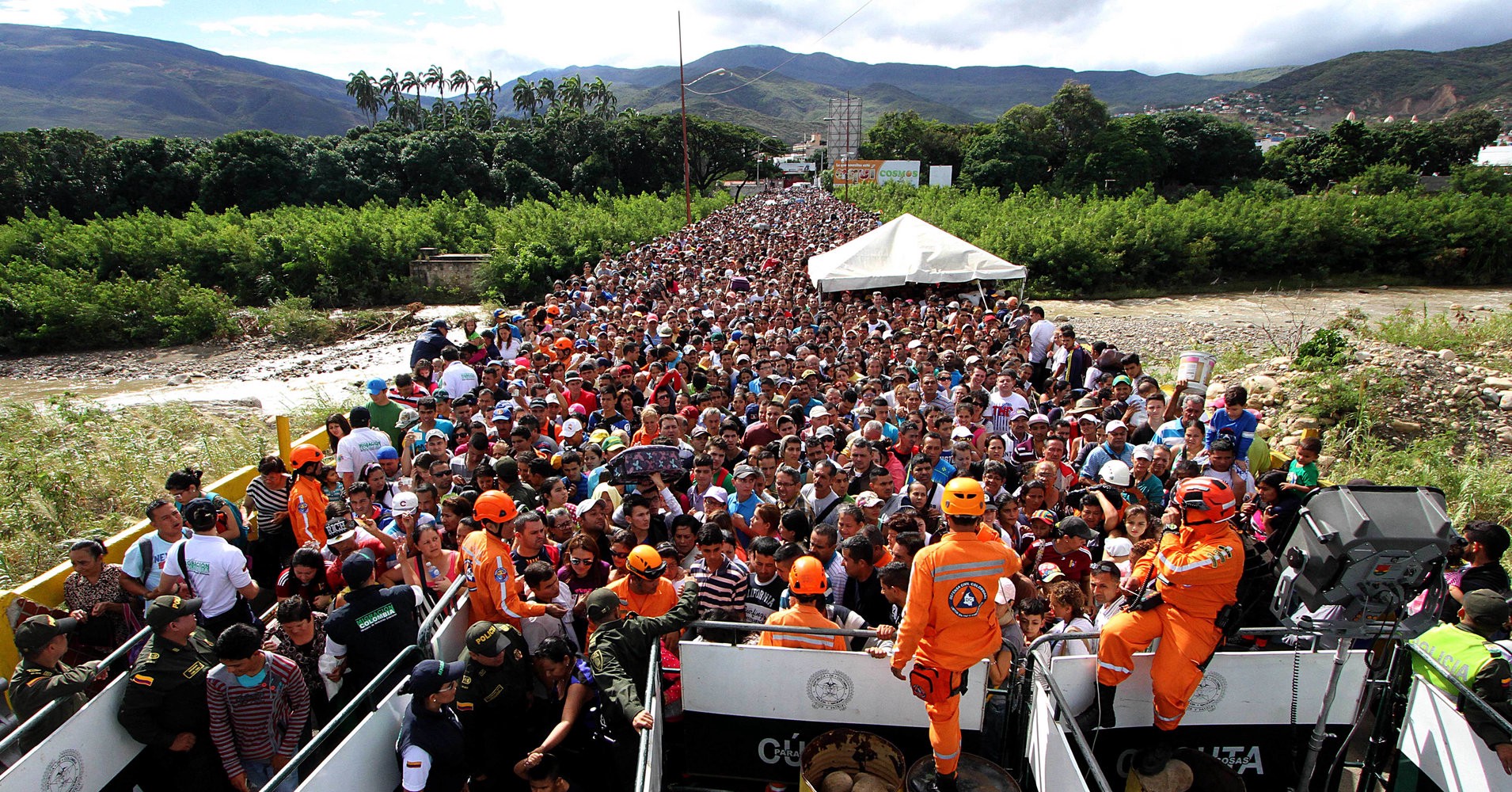As Syrian refugees continue to arrive in battered dinghies to the shores of Europe, a migration of similar urgency is taking place in Latin America. The Venezuelan crisis has its roots in the poor transfer of dictatorial power and an over-reliance on oil exports. However, this issue of politics and economics has transformed into a long-term humanitarian crisis. Conditions further deteriorate each year- causing hyperinflation, food and medicine shortages and widespread crime. Over 4 million Venezuelans (which accounts for 10% of the population) have emigrated in the last 20 years. These migrants have sought better lives in neighbouring countries such as Colombia, Brazil, Trinidad and Tobago, and the US. Nevertheless, questions have arisen- as they always do- on whether these migrants can be considered refugees. By definition, not all those who have emigrated classify as refugees fleeing persecution and thus, cannot all be granted asylum. Many cite economic reasons and a lack of medicines as causes of their emigration, which disqualifies them from refugee status by international standards. Yet, what these standards fail to recognise is that the economic and the political are so heavily intertwined. Financial turmoil stems from political tyranny. This relationship must be considered before asylum seeker cases are dismissed on grounds of not meeting the condition of persecution in their home country. This is merely an excuse which has been used time and time again to ease the international community’s burden of responsibility.
Background On The Crisis
In 2013, Venezuela’s long-term socialist dictator- Hugo Chavez- died. Chavez spent 18 years in office. His rule can be characterised by the corruption of democratic institutions, repression and the funnelling of oil export revenues into social development projects. Venezuela under his rule was the richest economy south of the US due to its success in exporting oil at high prices. Between 1998 and 2013, poverty had reduced from 50% to 30%. Venezuela’s economic indicators showed the lowest levels of economic inequality in Latin America. Although, many have disputed the level of poverty alleviation in Chavist Venezuela as state figures have tended to not reflect reality.
Moreover, this limited success was completely reversed after the loss of the charismatic leader and a plunge in global oil prices. Nicolas Maduro replaced Chavez as President of Venezuela in April 2013. He hoped to continue the financing of public goods in order to maintain popular support for the undemocratic regime. The economy at the time was already under pressure, with inflation rates at nearly 70%. Come 2015, oil prices across the world plummeted to historic lows and Venezuela took the biggest blow. Over 95% of export revenues are comprised of oil, making Venezuela highly dependent on the commodity. An already struggling economy was met with the need to fix their exponentially growing deficit in the face of dwindling public support. This, along with poor management of the macroeconomy, has beyond immobilized the Venezuelan economy.
Why Emigrate?
Today, Venezuelans are experiencing 6,000% inflation. The country’s lower and middle class continue to grapple with limited food and medicine supplies. Malnutrition has become a poorly kept secret by the government, the brunt of which has been borne by children nationwide. Winding ration ques for basic necessities has been the government’s solution to this problem. As of 2017, the poverty rate climbed to 82%. These dire conditions have resulted in what some have called a homicide epidemic. A study shows that the chances of being murdered are 98 out of 100,000. Overcome holistically by insecurity, in October of 2017 between 6 to 8 million took to the streets in demand for change. The government met these demands with resistance and a ban on protests. 130 protesters were killed and over 4,800 arrested by police. Such statistics provide us with only a sliver of the violent and impoverished reality many Venezuelans are facing. Thus, the reasons why Venezuelans are emigrating by the thousands are self-evident.
4 million Venezuelans have emigrated to neighboring Latin American states, seeking the stability, opportunities, securities, and liberties they are entitled to. Colombia and Brazil in have been popular and contentious destinations. Both countries currently host 600,000 and 30,000 Venezuelans respectively. However, in recent months this influx in migrants has been met with hostility. The Colombian and Brazilian governments have ramped up border security. Colombia has gone to the extent of raiding towns and rounding up Venezuelans without the correct documentation or permits for deportation. In addition, those that have gained temporary permits for settlement are denied work authorization and education.
A Change In Convention
A precondition to such treatment is the failure of many of these migrants to qualify for asylum seeker status. Upon questioning by authorities, many cite economic turmoil as the purpose for their emigration out of Venezuela. This in itself disqualifies them from refugee status. Refugees, as defined by the 1951 UN Refugee Convention, are those who are “unable or unwilling to return to their country of origin owing to a well-founded fear of being persecuted for reasons of race, religion, nationality, membership of a particular social group, or political opinion.” This very limited definition of what constitutes a refugee has been repeatedly criticised for failing to effectively protect the rights of those in need of international protection, such as the people of Venezuela. It is an obvious flaw in the Refugee Convention, which is the only binding agreement on the treatment of refugees yet is in dire need of reform.
In a guidance note, the UNHCR urged Latin American states to abide by refugee-like standards when dealing with the crisis. It also urged states to consider their regional agreement, the 1984 Cartagena Declaration on Refugees. The agreement is a far more progressive conception of refugees. It expands on who can be considered a refugee by adding: “persons who have fled their country because their lives, security or freedom have been threatened by generalized violence, foreign aggression, internal conflicts, massive violation of human rights or other circumstances which have seriously disturbed public order”. This is vastly more relevant to those in need of international protection in Latin America, where displacement as a result of internal strife and corrupt regimes is much more likely.
In this respect, the Cartagena Declaration proves the inadequacy of the 1951 Refugee Convention and the need for rethinking the agreement. 1951 was a very different time and the terms of the Convention go to show this. The Refugee Convention was largely created in response to the turbulent 1940s and 50s when Europe faced brutal totalitarian regimes such as Hitler’s Germany and Stalin’s Russia. Both these tyrants targeted individuals based on their membership within a religion, social group or nationality. Examples include the persecution of the Jews in Nazi Germany during Hitler’s reign, as well as Stalin’s ruthless purge of the Kulak socio-economic group. The Convention thus fails to address modern situations where international protection may be needed.
“The personal is political, the political economic, and the economic a system of life and death, most of all for those on the lowest rungs.”
– https://extranewsfeed.com/forced-migration-and-neoliberalism-f9394022d118
Threats to our globalizing world have shifted: from problems of fascism to democratic break-down and ever-widening disparities. In the context of the 21st Century, growing poverty is not simply a shortcoming of the meritocratic capitalism. Poverty is not a chance encounter in today’s world. It is the combination of undemocratic corrupt regimes, unfair trade terms, and under-development that causes crises like the one we see in Venezuela. The inequitable distribution of resources is purposefully maintained by the powers that be.
Take Haiti as an example. By 2015, 676,000 Haitian immigrants were living in the US. Haitian immigrants were popularly assumed to be escaping the disaster that came with the devastating earthquake of 2010. While the natural disaster did act as a major push factor for Haitians to emigrate, Haitians have been fleeing their country by the thousands for decades. The authoritarian government of Francois Duvalier (1957-1971) and later his son Jean-Claude Duvalier (1971-1986) plundered the economic prospects of the island nation while they personally lived flamboyantly. They embezzled 80% of the international aid Haiti received at a point. They created a repressive regime, topped off with the infamous Tonton Macoute (translates to Bogey Man) paramilitary. The Tonton Macoute was responsible for between 30,000 and 60,000 deaths. All the while, the US continued to support this morally bankrupt government through trade and aid due to its anti-communist leanings until 1986. Why is this relevant to our discussion? Haitians have sought refuge from tyranny for decades. By 1972, Haitians arrived in boats to Florida, seeking political asylum. Yet, only 100 claims were accepted by US authorities, who saw them to be fleeing poverty, not political persecution. However, this was a poor excuse. The need for protection stems from both the intentional exacerbation of poverty by poor government policies and the political violence and fear under the Duvalier regime.
Such considerations blur the line that differentiates an economic migrant from a refugee. Moreover- how different is the plight of starvation, widespread crime and the lack of access to medicines- to violence? State apparatus are the agents of this plight and have in many ways hindered the chances of survival of the 99%.
However, a shift in our perceptions of what constitutes a person in need of international protection has further repercussions. The expansion of the definition of a refugee would, in turn, oblige states to open their borders to a greater number of individuals, especially between the American continents. While I would like to argue that these people fleeing from undemocratic regimes and human rights abuses should be taken in by other states, this would simply be unrealistic in today’s fearful world. The norms that oblige states to comply with international humanitarian standards are already under threat. Many states such as the US, Italy, and Greece find the current standards of humanitarian obligation too high as it is. Moreover, the nativist-leaning political movements that have swept the United States and Western Europe is further evidence of this reluctance.
And so, we are back in the never-ending conundrum of trying to align pragmatism and idealism. If anything, by the end of this discussion a few things should be pretty clear. The definitions by which we include and exclude people from protection are not absolute, and the contexts in which they were created are largely irrelevant to today’s world. The international community is not passive in such crises of poverty, war and forced migration, instead they play an important role in allowing such imbalances of political and economic power to exist. And finally, the exclusion of people from protection against systemic poverty and morally bankrupt regimes is pragmatic and in need of change.
Featured Image Source: https://medium.com/@MiKolombia/what-venezuelas-refugee-crisis-means-for-colombia-part-1-dfc35f680f2e






Be First to Comment